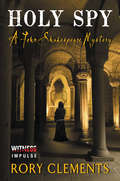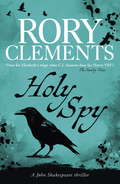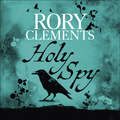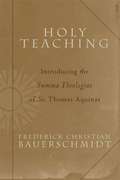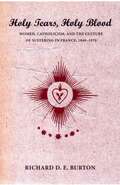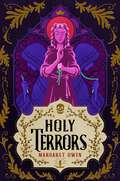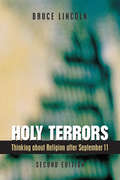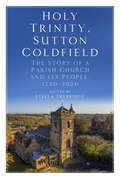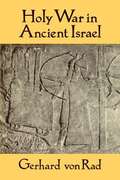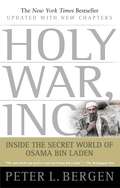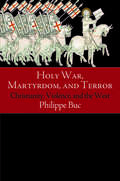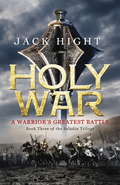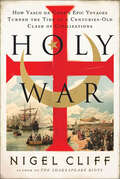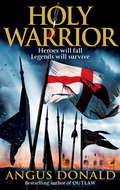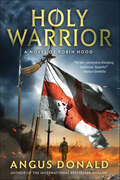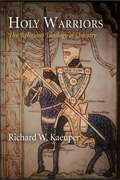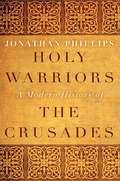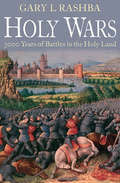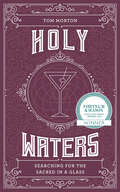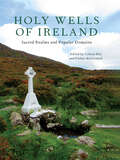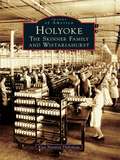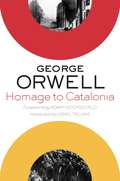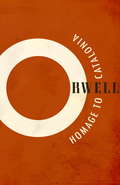- Table View
- List View
Holy Spy
by Rory ClementsFor fans of CJ Sansom and SJ Parris, Holy Spy features the Queen's Intelligencer John Shakespeare in the latest of Rory Clements's acclaimed and bestselling series of Tudor spy thrillersIn London's smoky taverns, a conspiracy is brewing: a group of wealthy young Catholic dissidents plot to assassinate Elizabeth, free Mary Queen of Scots--and open England to Spanish invasion. But the conspirators have been infiltrated by Sir Francis Walsingham's top intelligencer, John Shakespeare.Shakespeare, however, is torn: the woman he loves stands accused of murder. In a desperate race against time he must save her from the noose and the realm from treachery. And then it dawns that both investigations are inextricably linked--by corruption very close to the seat of power...Published by William Morrow
Holy Spy: John Shakespeare 6 (John Shakespeare #7)
by Rory Clements*****Part of the bestselling John Shakespeare series of Tudor spy thrillers from Rory Clements, winner of the Ellis Peters Historical Fiction Award*****'[Clements] does for Elizabeth's reign what CJ Sansom does for Henry VIII's' Sunday Times**********In London's smoky taverns, a conspiracy is brewing: a group of wealthy young Catholic dissidents plot to assassinate Elizabeth, free Mary Queen of Scots - and open England to Spanish invasion. But the conspirators have been infiltrated by Sir Francis Walsingham's top intelligencer, John Shakespeare.Shakespeare, however, is torn: the woman he loves stands accused of murder. In a desperate race against time he must save her from the noose and the realm from treachery. And then it dawns that both investigations are inextricably linked - by corruption very close to the seat of power . . .
Holy Spy: John Shakespeare 6 (John Shakespeare #7)
by Rory ClementsFor fans of C J Sansom and S J Parris, HOLY SPY features the Queen's Intelligencer John Shakespeare in the latest of Rory Clements' acclaimed and bestselling series of Tudor spy thrillers. Clements, winner of the Ellis Peters Historical Fiction Award, 'does for Elizabeth's reign what C.J. Sansom does for Henry VIII's' Sunday TimesIn London's smoky taverns, a conspiracy is brewing: a group of wealthy young Catholic dissidents plot to assassinate Elizabeth, free Mary Queen of Scots - and open England to Spanish invasion. But the conspirators have been infiltrated by Sir Francis Walsingham's top intelligencer, John Shakespeare.Shakespeare, however, is torn: the woman he loves stands accused of murder. In a desperate race against time he must save her from the noose and the realm from treachery. And then it dawns that both investigations are inextricably linked - by corruption very close to the seat of power . . .(P)2015 Hodder & Stoughton
Holy Spy: John Shakespeare 6 (John Shakespeare #7)
by Rory Clements*****Part of the bestselling John Shakespeare series of Tudor spy thrillers from Rory Clements, winner of the Ellis Peters Historical Fiction Award*****'[Clements] does for Elizabeth's reign what CJ Sansom does for Henry VIII's' Sunday Times**********In London's smoky taverns, a conspiracy is brewing: a group of wealthy young Catholic dissidents plot to assassinate Elizabeth, free Mary Queen of Scots - and open England to Spanish invasion. But the conspirators have been infiltrated by Sir Francis Walsingham's top intelligencer, John Shakespeare.Shakespeare, however, is torn: the woman he loves stands accused of murder. In a desperate race against time he must save her from the noose and the realm from treachery. And then it dawns that both investigations are inextricably linked - by corruption very close to the seat of power . . .
Holy Teaching: Introducing the Summa Theologiae of St. Thomas Aquinas
by Kenneth W. Thomas Frederick Christian BauerschmidtA book that offers an introduction to Thomas Aquinas with selections from the Summa Theologiae and explanatory commentary.
Holy Tears, Holy Blood: Women, Catholicism, and the Culture of Suffering in France, 1840–1970
by Richard D. E. BurtonIn Holy Tears, Holy Blood, Richard D. E. Burton continues his investigation of Catholic France from Revolution to Liberation. From his focus in Blood in the City on public demonstrations of the cultural power of Catholicism, he now turns to more private rituals, those codes of conduct that shaped the interior lives of French Catholic women and determined their artistic and social presentation. "Here there is rather less blood, and considerably more weeping," Burton says. In portraits of eleven women, including Simone Weil and Sainte Thèrése, he traces the lasting power of particular expressions of suffering and sacrifice. How, Burton asks, does a rapidly modernizing society accommodate the cultural-historical legacy of religious belief, in particular the extreme conservative beliefs of ultramontane Catholicism? Burton pays particular attention to the doctrine of "vicarious suffering," whereby an individual suffers for the redemption of others, and to certain extreme forms of religious experience including stigmatization, self-starvation, visions, and apparitions.
Holy Terrors (Little Thieves)
by Margaret OwenIt has been almost two years since she defeated the vengeful spirit of her mother, but Vanja Ros - no longer Schmidt - has finally made a name for herself. She is a God Daughter, a (reformed) thief, and now a folk hero. She stands up for those with nothing, bringing justice and prosperity where she can.But members of the royal families are turning up dead, found with Vanja's calling card on the bodies. And as old flames, adversaries, and allies resurface, Vanja must face what it took to become the Pfennigist once and for all.It will take everything she is to save not only herself and the people she loves, but time as we know it.
Holy Terrors: Thinking about Religion after September 11
by Bruce LincolnIt is tempting to regard the perpetrators of the September 11th terrorist attacks as evil incarnate. But their motives, as Bruce Lincoln's acclaimed Holy Terrors makes clear, were profoundly and intensely religious. Thus what we need after the events of 9/11, Lincoln argues, is greater clarity about what we take religion to be.
Holy Trinity, Sutton Coldfield: The Story of a Parish Church and its People, 1250-2020
by Stella ThebridgeFor the first time in its 750-year existence, a full history of Holy Trinity is available to the general public. One of only a small number of parish churches to be Grade I listed, Holy Trinity displays its rich heritage through stained glass, memorials, unique woodwork and glorious painted ceilings. It also houses the tomb of Sutton Coldfield’s most famous son, John Vesey, Bishop of Exeter, whose work for the benefit of both church and town, with the blessing of King Henry VIII, continues to earn him the respect of the local community in every generation. Funding from the Heritage Lottery Fund in 2017-19 has enabled this book to be researched and written. The timing of its publication enables the history to be as up-to-date as possible, following on from a major reordering of the church interior to create a space for church and community fit for the 21st century.
Holy War in Ancient Israel
by Gerhard Von RadTranslation of Der Heilige Krieg im alten Israel from German into English.
Holy War, Inc.: Inside the Secret World of Osama Bin Laden
by Peter L. BergenOn September 11, 2001, the world in which we live was changed forever. The twin towers of the World Trade Center came crashing down, one side of the Pentagon burst into flame, and more than six thousand men, women, and children lost their lives in the most deadly terrorist attack on American soil. As shocking as it was, it had been long in the making: The assault was the most sophisticated and horrifying in a series of operations masterminded by Osama bin Laden and his Jihad group -- an organization that CNN's terrorism analyst Peter Bergen calls Holy War, Inc. One of only a handful of Western journalists to have interviewed the world's most wanted man face to face, Peter Bergen has produced the definitive book on the Jihadist network that operates globally and in secrecy. In the course of four years of investigative reporting, he has interviewed scores of insiders -- from bin Laden associates and family members to Taliban leaders to CIA officials -- and traveled to Afghanistan, Yemen, Egypt, Pakistan, and the United Kingdom to learn the truth about bin Laden's al Queda organization and his mission. Immense in scope and unnerving in its findings,Holy War, Inc. reveals:How bin Laden lives, travels, and communicates with his "cells. " How his role in the crushing defeat of the Soviet Union in Afghanistan made him a hero to Muslims all over the world -- and equipped him to endure a long and bloody siege. How the CIA ended up funding -- to the tune of three billion dollars -- radical, anti-American Afghan groups allied to bin Laden. How the attacks that foreshadowed the destruction of the World Trade Center -- among them the bombings of the American embassies in Africa and the warship USSColein Yemen -- were planned and executed. The dimensions of bin Laden's personal fortune, and why freezing his assets is both futile and nearly impossible. The ideology of bin Laden's number two, the man who has influenced him most profoundly in his holy war -- the Egyptian Ayman al Zawahiri. What we can expect from Islamist extremists in the future. Above all, Peter Bergen helps us to see bin Laden's organization in a radically new light: as a veritable corporation that has exploited twenty-first-century communications and weapons technologies in the service of a medieval reading of the Koran and holy war. Holy War, Inc. is essential reading for anyone trying to understand tomorrow's terrorist threats and the militant Islamist movements that could determine the fate of governments -- and human lives -- the world over. Both author and publisher will donate a portion of the proceeds from this book to United Way's September 11th Fund for the relief of victims of the World Trade Center attacks.
Holy War, Martyrdom, and Terror: Christianity, Violence, and the West (Haney Foundation Series)
by Philippe BucHoly War, Martyrdom, and Terror examines the ways that Christian theology has shaped centuries of conflict from the Jewish-Roman War of late antiquity through the First Crusade, the French Revolution, and up to the Iraq War. By isolating one factor among the many forces that converge in war—the essential tenets of Christian theology—Philippe Buc locates continuities in major episodes of violence perpetrated over the course of two millennia. Even in secularized or explicitly non-Christian societies, such as the Soviet Union of the Stalinist purges, social and political projects are tied to religious violence, and religious conceptual structures have influenced the ways violence is imagined, inhibited, perceived, and perpetrated.The patterns that emerge from this sweeping history upend commonplace assumptions about historical violence, while contextualizing and explaining some of its peculiarities. Buc addresses the culturally sanctioned logic that might lead a sane person to kill or die on principle, traces the circuitous reasoning that permits contradictory political actions, such as coercing freedom or pardoning war atrocities, and locates religious faith at the backbone of nationalist conflict. He reflects on the contemporary American ideology of war—one that wages violence in the name of abstract notions such as liberty and world peace and that he reveals to be deeply rooted in biblical notions. A work of extraordinary breadth, Holy War, Martyrdom, and Terror connects the ancient past to the troubled present, showing how religious ideals of sacrifice and purification made violence meaningful throughout history.
Holy War: Book Three of the Saladin Trilogy
by Jack HightIn HOLY WAR, the final book of the Saladin Trilogy, telling the story of the legendary war leader who united Arabia, Saladin recaptures Jerusalem from the Crusaders, and prepares for his ultimate battle against Richard the Lionheart. A full-blooded historical adventure novel for all fans of Conn Iggulden, Bernard Cornwell, Anthony Riches, Ben Kane, Robyn Young and Simon Scarrow.While Saladin ruthlessly sets about uniting the whole of Arabia under his rule, the Kingdom of Jerusalem is torn apart by treachery and intrigue, and when the murderous knight Reynald of Chatillon raids a caravan heading from Damascus to Mecca and rapes Saladin's sister, the scene is set for war.In June 1187, Saladin marches into the Kingdom with an army of over 24,000 and imposes a crushing defeat on the Crusader forces at the Horns of Hattin. It is only a matter of time before he marches on a panicked and demoralized Jerusalem.But what about Saladin's longtime ally, the Saxon knight John of Tatewic? In the face of annihilation, is he friend or foe? It will take all John's knowledge of the man he calls his brother to negotiate a peaceful fate for Jerusalem - but this is not the end of the story. For in England the soon-to-be crowned King Richard has pledged revenge and a new Crusade . . .
Holy War: How Vasco da Gama's Epic Voyages Turned the Tide in a Centuries-Old Clash of Civilizations
by Nigel CliffA radical reinterpretation of da Gama’s pioneering voyages, revealing their role as a decisive turning point in the struggle between Christianity & Islam.In 1498 a young captain sailed from Portugal, circumnavigated Africa, crossed the Indian Ocean, and discovered the sea route to the Indies and, with it, access to the fabled wealth of the East. It was the longest voyage known in history. The little ships were pushed beyond their limits, and their crews were racked by storms and devastated by disease. However, their greatest enemy was neither nature nor even the sheer dread of venturing into unknown worlds that existed on maps populated by coiled, toothy sea monsters. With bloodred Crusader crosses emblazoned on their sails, the explorers arrived in the heart of the Muslim East at a time when the old hostilities between Christianity and Islam had risen to a new level of intensity. In two voyages that spanned six years, Vasco da Gama would fight a running sea battle that would ultimately change the fate of three continents.An epic tale of spies, intrigue, and treachery; of bravado, brinkmanship, and confused and often comical collisions between cultures encountering one another for the first time; Holy War also offers a surprising new interpretation of the broad sweep of history. Identifying Vasco da Gama’s arrival in the East as a turning point in the centuries-old struggle between Islam and Christianity—one that continues to shape our world—Holy War reveals the unexpected truth that both Vasco da Gama and his archrival, Christopher Columbus, set sail with the clear purpose of launching a Crusade whose objective was to reach the Indies; seize control of its markets in spices, silks, and precious gems from Muslim traders; and claim for Portugal or Spain, respectively, all the territories they discovered. Vasco da Gama triumphed in his mission and drew a dividing line between the Muslim and Christian eras of history—what we in the West call the medieval and the modern ages. Now that the world is once again tipping back East, Holy War offers a key to understanding age-old religious and cultural rivalries resurgent today.
Holy Warrior (Outlaw Chronicles #2)
by Angus DonaldArrows will fly. Swords will swing. Heroes will fall. Legends will survive. And the Holy Land will never be the same.1190 AD: Richard the Lionheart has launched his epic crusade to seize Jerusalem from the cruel Saracens. Marching with the vast royal army is Britain's most famous, most feared, most ferocious warrior: the Outlaw of Nottingham, the Earl of Locksley -- Robin Hood himself.With his band of loyal men at his side, Robin cuts a bloody swathe on the brutal journey east. Daring and dangerous, he can outwit and outlast any foe -- but the crimson battlefields of the Holy Land are the ultimate proving ground. And within Robin's camp lurks a traitor -- a stealthy enemy determined to slay Christendom's greatest outlaw before the trumpets fade.Blazingly paced and richly imagined, featuring a cast of unforgettable characters and packed with fast, furious action, Holy Warrior is adventure at its thrilling, white-knuckle best.
Holy Warrior: A Novel Of Robin Hood (Outlaw Chronicles #2)
by Angus DonaldKing Richard the Lionheart has been crowned, and his loyal subject Robin Hood is preparing an army to take on the Third Crusade with Richard's forces to free the Holy Land from the grip of Saladin and his victorious Saracen army.In Sicily, en route to the Holy Land, the crusaders sack the town of Messina and Alan rescues and then falls in love with a beautiful Muslim slave-girl. But someone is trying to assassinate Robin - possibly the duo's old enemy Sir Richard Malbisse, who joins King Richard's army in Sicily and very soon has the royal ear as a favoured courtier.As Alan and Robin fight their way through the conquest of Cyprus, the siege of Acre and the climatic carnage of the battle of Arsuf near modern-day Tel Aviv, Alan discovers that Robin's motive for coming to the Holy Land is not as honourable as he had imagined...
Holy Warrior: A Novel of Robin Hood (The Outlaw Chronicles #2)
by Angus DonaldRobin Hood and his sidekick, Alan Dale, battle Saracens in the Crusades and treachery in his camp in this historical adventure by the author of Outlaw.In 1190 A.D. Richard the Lionheart, the new King of England, has launched his epic crusade to seize Jerusalem from the Saracens. Marching with the vast royal army is Britain’s most famous, feared, and ferocious warrior: the Outlaw of Nottingham, the Earl of Locksley—Robin Hood himself. With his band of loyal men at his side, Robin cuts a bloody swath on the brutal journey east. Daring and dangerous, he can outwit and outlast any foe, but the battlefields of the Holy Land are the ultimate proving ground. And within Robin’s camp lurks a traitor—a hidden enemy determined to assassinate England’s most dangerous rogue.Richly imagined and furiously paced, featuring a cast of unforgettable characters, Holy Warrior is adventure, history, and legend at its finest.
Holy Warriors
by Richard W. KaeuperThe medieval code of chivalry demanded that warrior elites demonstrate fierce courage in battle, display prowess with weaponry, and avenge any strike against their honor. They were also required to be devout Christians. How, then, could knights pledge fealty to the Prince of Peace, who enjoined the faithful to turn the other cheek rather than seek vengeance and who taught that the meek, rather than glorious fighters in tournaments, shall inherit the earth? By what logic and language was knighthood valorized?In Holy Warriors, Richard Kaeuper argues that while some clerics sanctified violence in defense of the Holy Church, others were sorely troubled by chivalric practices in everyday life. As elite laity, knights had theological ideas of their own. Soundly pious yet independent, knights proclaimed the validity of their bloody profession by selectively appropriating religious ideals. Their ideology emphasized meritorious suffering on campaign and in battle even as their violence enriched them and established their dominance. In a world of divinely ordained social orders, theirs was blessed, though many sensitive souls worried about the ultimate price of rapine and destruction.Kaeuper examines how these paradoxical chivalric ideals were spread in a vast corpus of literature from exempla and chansons de geste to romance. Through these works, both clerics and lay military elites claimed God's blessing for knighthood while avoiding the contradictions inherent in their fusion of chivalry with a religion that looked back to the Sermon on the Mount for its ethical foundation.
Holy Warriors: A Modern History of the Crusades
by Jonathan PhillipsWhen George Bush inaugurated the War on Terror in 2001, he referred to it as a 'crusade'. A medieval Crusade could be defined thus: a holy war initiated by the Pope on God's behalf in which the participants took the cross and received remission for their sins. The First Crusade, launched in 1095, ushered in a period of almost 200 years of Christian rule in the Levant, yet over time crusades were directed against a variety of opponents, not just Muslims in the Middle East: against Cathar heretics, political enemies of the papacy, the Mongols, pagan tribes of northern Europe, and the Ottoman Turks, well into the sixteenth century. While the notion of fighting for one's faith fell into disrepute during the Enlightenment, whose proponents viewed the idea as primitive and barbaric, in reality the cultural engines of romanticism and orientalism gave the memory of the crusades a significant boost in the nineteenth century. The notion of moral right buttressed by royal authority helped to drive the expansion of European power through imperialism and colonialism, and in both World Wars the theme of crusading was used as a call to arms. As Jonathan Philips demonstrates in this timely and revealing study, crusading has proven to be a remarkably adaptable and long-lasting phenomenon, embedded in the actions and consciousness of the West for centuries. Unlike other histories of the Crusades this one firstly comes up to the present day and secondly, avoids a chronological slog through the whole movement. Instead it drills a series of bore holes into the key aspects and moments: The First Crusade, Richard the Lionheart and Saladin, the Templars, the Jihad, etc. Thirdly, it is incredibly vivid and accessible - we hear the swords, taste the food, see the sights and feel the heat.
Holy Wars: 3000 Years of Battles in the Holy Land
by Gary L. Rashba&“A compelling tale of how this spiritually and politically charged area of the globe has long been a place of pivotal battles&” (Library Journal). Today&’s Arab-Israeli conflict is merely the latest iteration of an unending history of violence in the Holy Land—a region that is unsurpassed as witness to a kaleidoscopic military history involving forces from across the world and throughout the millennia. Holy Wars describes three thousand years of war in the Holy Land with the unique approach of focusing on pivotal battles or campaigns, beginning with the Israelites&’ capture of Jericho and ending with Israel&’s last full-fledged assault against Lebanon. Its chapters stop along the way to examine key battles fought by the Philistines, Assyrians, Greeks, Romans, Arabs, Crusaders, and Mamluks—the latter clash, at Ayn Jalut, comprising the first time the Mongols suffered a decisive defeat. The modern era saw the rise of the Ottomans and an incursion by Napoleon, who only found bloody stalemate outside the walls of Akko. The Holy Land became a battlefield again in World War I when the British fought the Turks. The nation of Israel was forged in conflict during its 1948 War of Independence, and subsequently found itself in desperate combat, often against great odds, in 1956 and 1967, and again in 1973, when it was surprised by a massive two-pronged assault. By focusing on the climax of each conflict, while carefully setting each stage, Holy Wars examines an extraordinary breadth of military history—spanning in one volume the evolution of warfare over the centuries, as well as the enduring status of the Holy Land as a battleground.
Holy Waters: Searching for the sacred in a glass
by Tom MortonTom Morton, keen motorcyclist, funeral celebrant and whisky aficionado, takes us on a journey around the globe, exploring the links between famous alcoholic spirits and spirituality.Waters of life. Distilled spirits of all kinds have borne that name, in various tongues, since time immemorial. Aqua vita. Eau de vie. Uisge Beatha.Tom Morton has travelled the world in search of the finest drams the planet has to offer. His journeys reveal the links between faith and alcohol, between spirits and the spiritual. From Christianity&’s Holy Communion to the temple libations of Japan, through the rum concoctions of Haitian Voodoo to the monastic producers of every liquid from beer to "tonic" wine. And of course Tom&’s beloved whisky, brewed in many corners of the world.Holy Waters is Tom&’s journey to the spiritual heart of whisky, sake, rum, Champagne, beer, mead and a variety of wines. With great insight, humour and for the most part sobriety, he traces the links between brewing, winemaking, distilling and worship, from ancient pagan rites to the most modern Trappist technology. He revels in the lore and mysteries of craft production, the elemental, magical love stories, the passionate relationships between human and landscape, grain and pure water, grape and fire. And he does so on a motorcycle which, to his astonishment, runs very well on cask-strength Islay single malt. This book is a celebration of cultures and artisan craft, a book for food and drink, travel and history lovers.
Holy Wells of Ireland: Sacred Realms and Popular Domains (Irish Culture, Memory, Place)
by Ray Cashman Celeste Ray Ronan Foley Bruce Misstear Gary Branigan Michael Gibbons Amanda Clarke Claire Collins Eileen Murphy Carol Barron Eugene Broderick Attracta Brownlee Janet Cassidy Hannah Chew Anne Cormican Christy Cunniffe Colm Donnelly Maura Egan Noel French Laurence Gill Annie Griffith Michael Houlihan Ryan Lash Shane Lehane Shane Lordan Geraldine Lynch Niall Mac Coitir John Makem Bernadette Masterson Patrick McAteer Rita McCarthy Finbar McCormick Tamlyn McHugh Cora McKenna Edward N. Moran Stiofán Ó Cadhla Suzanne Pegley Gerry A. Quinn Anja Renkes Fred TernanThe storied landscapes of Ireland are dotted with holy wells—hallowed springs, pools, ponds, and lakes credited with curative powers and often associated with Catholic and indigenous saints. While many of these sites have been recently lost to development, others are visited daily for devotions and remain the focus of annual community gatherings.Encouraging both their use and protection, Holy Wells of Ireland delves into these irreplaceable resources of spiritual, archaeological, and historical significance. Reserves of localized spiritual practices, holy wells are also ecosystems in themselves and provide habitats for rare and culturally meaningful flora and fauna. The shift toward a "post-Catholic" Ireland has prompted renewed interest in holy wells as popular domains with organic faith traditions. Of the roughly 3,000 holy wells documented across Ireland, some attract international pilgrims and others are stewarded by a single family. Featuring 140 color images, this remarkable volume shares the transdisciplinary work of contributors who study these wells through the overlapping lenses of anthropology, archaeology, art history, biomedicine, folklore, geography, history, and hydrology. Braiding community perspectives with those of scholars across academia, Holy Wells of Ireland considers Irish holy wells as a resilient feature of ever-evolving Irish Christianity, as inspiration to other faith traditions, as places of pilgrimage and healing, and as threatened biocultural resources.
Holyoke: The Skinner Family and Wistariahurst
by Kate Navarra ThibodeauBorn in England in 1824, William Skinner was a tradesman who, at 19, immigrated to the United States. Skinner turned his skill and resourcefulness into a tremendous success. He first went to work in Northampton and eventually opened the Unquomonk Silk Mills in nearby Haydenville. Skinner would have remained there had a flood not destroyed his business. He built a new mill along the canals in Holyoke, one of America's first planned industrial cities, and moved his family home, Wistariahurst, to the city by dismantling it piece by piece. Residing in Holyoke for eight decades, the Skinner family contributed greatly to the community. Holyoke: The Skinner Family and Wistariahurst contains a rich legacy of photographs, letters, journals, and oral histories that provide an amazing view into life at Wistariahurst and the adventures of the family and their servants.
Homage to Catalonia
by George Orwell Adam Hochschild Lionel TrillingA National Review Top Ten Best Nonfiction Books of the Century "One of Orwell's very best books and perhaps the best book that exists on the Spanish Civil War."--The New Yorker In 1936, originally intending merely to report on the Spanish Civil War as a journalist, George Orwell found himself embroiled as a participant--as a member of the Workers' Party of Marxist Unity. Fighting against the Fascists, he described in painfully vivid and occasionally comic detail life in the trenches--with a "democratic army" composed of men with no ranks, no titles, and often no weapons--and his near fatal wounding. As the politics became tangled, Orwell was pulled into a heartbreaking conflict between his own personal ideals and the complicated realities of political power struggles. Considered one of the finest works by a man V. S. Pritchett called "the wintry conscience of a generation," Homage to Catalonia is both Orwell's memoir of his experiences at the front and his tribute to those who died in what he called a fight for common decency. This edition features a new foreword by Adam Hochschild placing the war in greater context and discussing the evolution of Orwell's views on the Spanish Civil War. "No one except George Orwell . . . made the violence and self-dramatization of Spain so burning and terrible."-- Alfred Kazin, New York Times "A wise book, one that once read will never be forgotten."--Chicago Sunday Tribune
Homage to Catalonia
by George OrwellA first-hand account of the horrors of the Spanish Civil War, straight from the pen of one of the twentieth century's most renowned authors.<P> In 1936, George Orwell enlisted with a left-wing Spanish militia organization, The Workers' Part of Marxist Unification, out of a combined desire to fight against fascism and to record the events of the war. He fought against the fascist forces for several months, before infighting among the various left-wing groups turned him against former allies, and eventually forced him to flee the country. Homage to Catalonia is a vivid, intensely personal retelling of these events. Penguin Random House Canada is proud to bring you classic works of literature in e-book form, with the highest quality production values. Find more today and rediscover books you never knew you loved.
